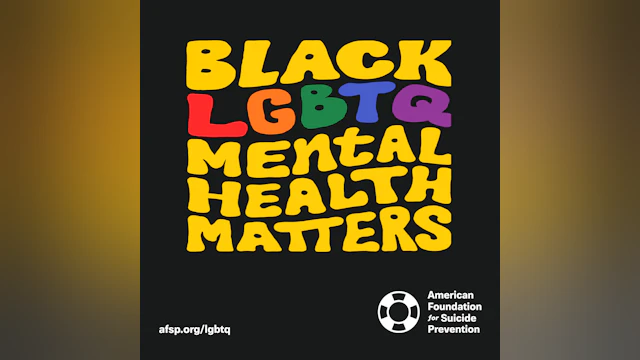This blog references suicide in the Black LGBTQ+. The story, “Coming Home,” in the book The Blue Street Stories. The story tells the love story of Angel and Warren, who at the end both take their own lives due to the pressure of society. Religious and social themes are expressed throughout the story.
The Black LGBTQ+ community, as a result of these overlapping identities, often faces social and religious stressors that have important mental health implications. For instance, Black LGBTQ+ people may experience increased isolation or risk of suicide because religion, a factor that has historically secured them community and bolstered their mental health, imposes additional burdens or creates additional strain. Understanding these dynamics is instrumental in mitigating suicide and promoting mental health in the Black LGBTQ+ community.
Religious beliefs can be both a source of security and support for Black LGBTQ+ people, because of the community, support and connection found within religious communities, as well as a source of discrimination and oppression due to some religious doctrines and interpretations that denigrate LGBTQ+ identities and increase internalized stigma and psychological distress. Mental health consequences can include anxiety, depression and suicidality.
Black LGBTQ+ people may be doubly or even triply marginalized: we may be ‘niggers or faggots’ (and the racialized and homophobic lateral violence that follows is so pervasive that we can hardly count on the protection of racial kin), we may not believe in God, or we may not believe in the God of our family’s religion, and so we are doubly rejected: not boys and girls, but even lesser than that – deviant. Religious doctrine that rejects or condemns LGBTQ+ identities can intensify feelings of alienation – that we are not welcome in the religious or racial community that claims us and that we are unwelcome in a community that claims another part of our identity. Social rejection combined with a religious belief that others have rightful claims on our spiritual allegiance may increase the likelihood of suicide by amplifying social and spiritual alienation.
Having community support and acceptance helps decrease suicide risk for Black LGBTQ+ people. For instance, religious communities that offer positive spaces for LGBTQ+ people can help individuals feel less isolated. Dream of Me also notes that religious services that are inclusive of LGBTQ+ identities and sexual orientation and gender identity/expression (SOGIE) support groups in churches can strengthen and enhance interpersonal connections, with the potential to decrease suicide risk.
There is also a need for culturally sensitive approaches to promoting mental health in Black LGBTQ+ communities that acknowledge and respect intersectional identities and develop outreach programs and other interventions that engage religious institutions to help create safe spaces and mental health communities as well as promote mental health literacy.
Everything we see on our TVs and read in our papers, whether it features a celebrity suicide or the latest bizarre religious opinion about LGBTQ+ people, shapes how we perceive suicide and religious attitudes to being LGBTQ+. If you can change the story, you can change people’s minds about something that could literally save their lives by dispelling myths and reducing stigma. If you can show people that there are plenty of supportive religious figures and affirming congregations, you can change people’s perception and encourage them to love and support LGBTQ+ people within their own communities.
Black LGBTQ+ people suffer from a distinct lack of access to mental health resources, especially when those particular resources are delivered in particular spaces that are religious – or even worse, in spaces that aren’t explicitly LGBTQ-inclusive. This systemic problem will require a systemic solution: for example, training religious leaders to become adept on many different LGBTQ+ issues, embedding mental health services into religious programs, and developing accessible mental health programs that are culturally sensitive.
Intervening on suicide in the Black LGBTQ+ community – rooted in the complex interplay of religion – demands substantial efforts. These encompass finding ways to bridge the gap between religion and acceptance of LGBTQ+ people; strengthening community resilience; and increasing mental health resources. It is possible to address suicidal ideation in an intersectional community through dialogue, cultural competence and inclusivity.
